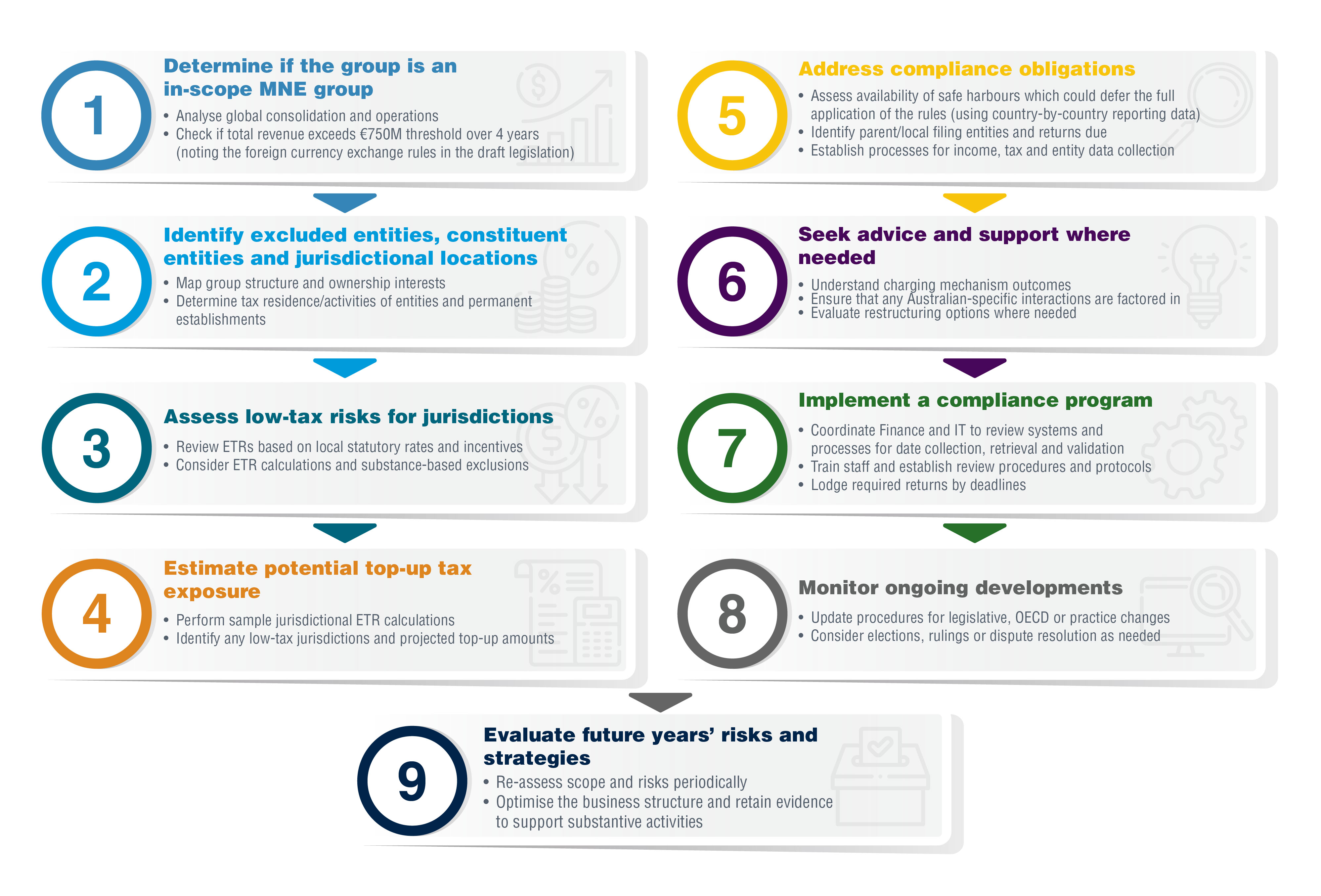Substance-based Income Exclusion:
- A carve-out percentage of payroll and tangible assets is excluded from the low-tax income inclusion base, focusing the rules on excess non-routine returns (subject to transitional rules until 31 December 2032).
- This aims to exclude a routine return commensurate with real economic activity from the GloBE taxing rights allocation.
Charging the Top-Up Tax:
- The IIR imposes tax on the ultimate or intermediate parent entity (UPE) based on its share of ownership in the low-taxed constituent entity.
- The UTPR will act as a backstop measure to the IIR, where any residual tax is allocated amongst cooperating jurisdictions. The details of the UTPR are currently left as a placeholder but the UPTR is expected to result in a denial of deductions based on their relative employees and tangibles assets based on OECD guidance.
- Australia’s DMT allows direct collection of tax on low-taxed Australian income.
Special Calculations:
- Flow-through entities are located based on where they are created or required to apply the IIR/UTPR.
- Joint ventures and subsidiaries are separately assessed unless fully consolidated, to prevent splitting of ownership to avoid the payment of top-up tax.
Safe Harbours and Transitional Rules:
- Three safe harbours may apply to an MNE group to either defer the full application of their GloBE and DMT obligations or reduce the administrative burden of computing the top-up tax.
- Transitional rules are available to take into account tax attributes at the start of the first income year in which the GloBE rules apply to the MNE group.
Implementation details from an Australian tax perspective
The rules seek to work cooperatively with the agreed upon OECD GloBE Model Rules by aligning definitions, computations and the rule priority order with the internationally agreed approach. Significant administrative discretion has been delegated to Treasury to update the Rules.
While compliance obligations are substantial, administrative penalties for failure to lodge have been increased to 500 times the base penalty amount (consistent with those that apply for significant global entities) to encourage timely compliance.
Below are some details regarding how the Australian tax law is expected to interact with the GloBE Rules:
- Payment of top-up tax under the IIR, UTPR and DMT will not be deductible.
- However, as the DMT is a domestic tax, payment of the DMT will give rise to franking credits for relevant Australian corporate tax entities. Similarly, franking debits will arise where DMT is refunded. The government is still seeking views on the timing of when these franking credits and debits arise.
- Three types of returns are required to be given to the Commissioner:
- A GloBE Information Return – a standardised return consistent with the OECD guidance
- An Australian GloBE Tax Return – contains information for the purpose of assessing IIR and UPTR top-up tax
- A DMT Return – contains information for the purpose of assessing DMT top-up tax
- Lodgement of these returns as well as payment of the top-up tax is due at the end of the 15th month following the end of the relevant income year, except for the first year which is extended to 18 months. The Commissioner does not have discretion to defer the time for lodgement of the GloBE Information Return but may defer the time for lodgement of the Australian GloBE Tax Return and DMT Return.
- Assessments of top-up tax payable under the IIR, UTPR and DMT are subject to an ATO review period of four years and can also be objected to, aligning with income tax returns.
- The head company of an Australian tax consolidated group will be primarily liable for the top-up tax of each entity in the group.
- The government’s consultation paper contemplates that foreign income tax offsets and nominal allowable deductions under the CFC rules should be available for any DMT top-up tax paid in a foreign jurisdiction, but not in relation to the IIR or UTPR.
- The consultation paper also contemplates that amendments are required to the hybrid mismatch rules and foreign hybrid rules in order to disregard top-up taxes paid under a foreign jurisdiction’s GLoBE and DMT rules.
Suggested Corporate Framework
Below is a suggested framework that a corporate group can use to assess the application of the Pillar Two rules and ensure compliance:

The A&M tax team has deep tax technical and compliance experience to help navigate these complex new rules, assist with an implementation program and assess how they apply to all types of businesses. Contact us to discuss your particular circumstances further.
[1] International taxation – global and domestic minimum tax – primary legislation | Treasury.gov.au and International taxation – global and domestic minimum tax – subordinate legislation | Treasury.gov.au
https://www.alvarezandmarsal.com/insights/australia-releases-draft-implement-pillar-two-international-tax-reforms

